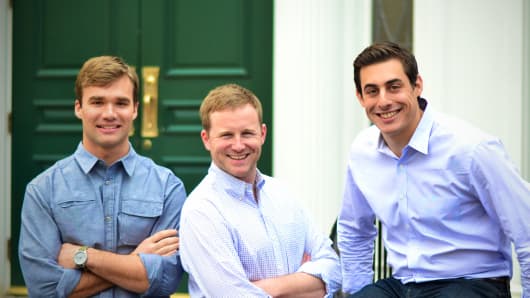If you're a mom and pop and always wanted a fancy consultant on your payroll for tasks ranging from accounting to building a mobile-social media strategy—there's a new start-up just for you.
Hourly Nerd.com is an online marketplace that offers MBA students for hire from the nation's top business schools. Fees range from $10 to $50 an hour ballpark. Those with deeper resumes charge up to $75 to $100 an hour.
The start-up is the brainchild of three Harvard Business School students—all under 30: Rob Biederman, 26; Peter Maglathlin, 27; and Patrick Petitti, 29. And like many entrepreneurial light-bulb moments, the idea was born from necessity.
An MBA degree can be pricey and students have the time to devote eight to 10 hours a week to short-term projects. Meanwhile, small-business owners broadly are at an interesting inflection point in a U.S. economy that's trying to gain traction.
Most mom and pops have cut costs to the bare bones since the recession. And many have no short-term hiring plans—a traditional driver of past economic recoveries. (Read more: Why Main Street Is Not Hiring, Growing)
Main Street needs to expand business organically again—but can't afford hires. And they certainly can't shell out for help from a fancy consulting, accounting or investment-banking firm.
That's where Hourly Nerd.com comes in.
"Small businesses need to start growing revenue again because there's no more cost cutting," co-founder Biederman said. "They need to explore ways of growing revenue without committing to a full-time hire," he said.
How Hourly Nerd.com Works
The start-up features a database of about 450 MBA students from the top business schools in the country, as well as international MBA students. No riffraffs here. The co-founders said quality of students is important to their business model's success.
Top students are matched with small-business projects—ranging from bookkeeping to, say, building a social media strategy to better reach customers.
The start-up idea, part of a Harvard class project, launched in February and quickly gained steam through word of mouth. Initial business clients included a Boston area florist, deli, gym, restaurant-bar and start-ups. Hourly Nerd.com has about 30 projects under its belt—and counting.
(Read more: Family Mom-Pops Resilient Amid Tough Times)
Even in such a short time after launch, the start-up is noticing smaller mom and pops generally need help formulating concepts and strategies. In contrast, larger small- to medium-sized businesses with millions in annual revenue seek help on specific projects and tasks, said Petitti, a co-founder.
(Read more: Meet the 17-Year-Old Who Is Reinventing News)





